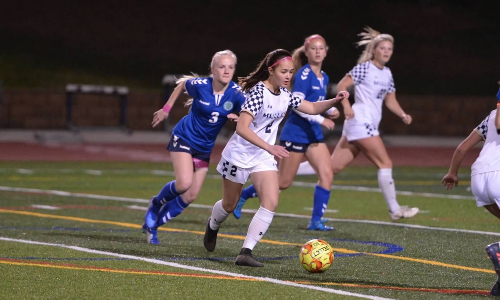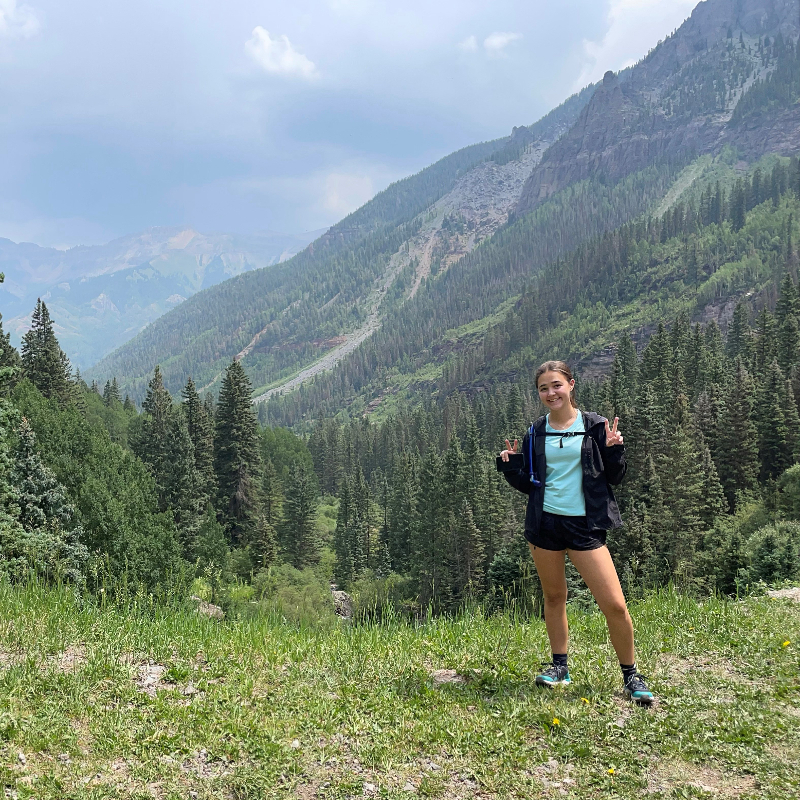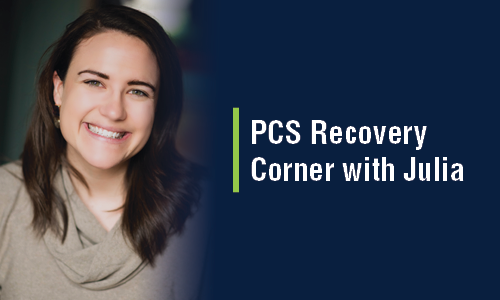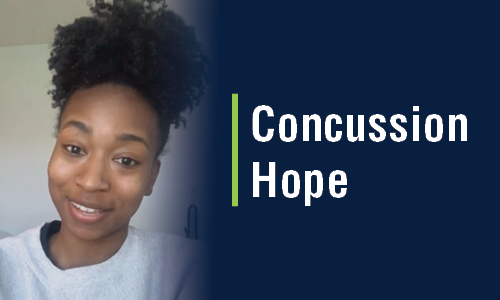Get Inspired
Overcoming PCS One Day at a Time
Lauren Creighton grew up loving the sport of soccer but had to give it up after a series of concussions, the last of which led to Post-Concussion Syndrome (PCS). Her recovery was a rollercoaster of good days and bad, but she eventually found hope after coming across resources on the CLF website and reading our gallery of Inspiring Stories. Below, Lauren shared her story to let others know they are not alone in their struggles and to know it will get better.

By Lauren Creighton
My name is Lauren Creighton. The last few years, I have been dealing with concussions and Post-Concussion Syndrome (PCS).
Before my concussions, I played soccer my entire life. Whether it was playing on the field, cheering on my teammates, watching professional games, or even playing FIFA, soccer was my true passion. I started playing around the age of three, which sparked my interest in the sport. I fell in love with the game and continued with club/competitive teams as I grew older.
I have had four concussions in my lifetime, all before the age of 18, and was diagnosed with PCS after my most recent one. I have been on a rollercoaster of recovery these last few years, searching for information, doctors, answers, and hope.
My last concussion happened in the beginning of my junior year of high school. I was playing in a scrimmage with my club team, five minutes were left in the game. It was a corner kick, and I was in the right spot for the ball to reach me. The ball came and I instinctively headed it. Immediately after, my head began to throb. I finished playing the last three or so minutes of the game and told my coach. He had no reason to think I had a concussion, nor did my teammates, and so I believed it as well. “How could just a header give me a concussion, when people do it all the time?” I told myself.
However, on my drive home, things went south. Sensitivity to light and sound, nausea, and a headache followed the practice. I knew the concussion symptoms like the back of my hand from previous ones, so this was a horrible familiar feeling. I knew I was going to have to heal from this concussion, but I did not know how long the recovery would take and how that would be my last real game of soccer.
I immediately struggled with the physical symptoms, which were followed by the emotional struggles. It was a rollercoaster of pain and healing. Some days were so bad I wouldn’t be able to get out of bed. I remember laying there almost all of Christmas break my junior year because I couldn’t do anything else.
My symptoms slowly got better, but every time I tried to do anything more in my recovery, it felt like I was stuck, and all my symptoms would return. I had to see a neurologist and a neuro-optometrist to heal my eyesight problem. My tracking had been affected, as one of my eyes had a slower reaction time than the other one. With some new PT exercises, I made great progress with my vision challenges. After this, I gained hope I was going to be fine. But when I tried to go outside, workout, or even walk into Target, my hypersensitivity to light and sound made normal activities impossible. I had pressure headaches and tingling on the top of my head. Because of these physical symptoms, my emotional and mental health took a toll. I fell into a spiral of isolation. I could barely describe what I was experiencing, which caused me to become frustrated with my circumstances. I was tired of feeling hurt, alone, and exhausted. I felt as though nobody knew what I was feeling, and because of this, I thought I would never get better. My hope was starting to fade. There were days where my symptoms were so bad I would have to lay in my dark room with no sound, no light, and just lay for hours. I was hurting so much, and the worst part was I couldn’t explain how I was feeling to anyone.
One of the hardest parts of this journey was the loss of soccer. The idea of never playing again really began to sink in, and it hurt. People never tell you how much giving up a sport to an injury feels like, and I was not prepared. I regretted the practices I had skipped in the past and wished I could go back and play a few more times. This was also during COVID-19, so the isolation was worse since I couldn’t see many people. And even when I was able to see friends, my symptoms would flare up and I wouldn’t be in the mood to hang out.
I lost a lot of friends during this time, especially because I was not able to be there for my soccer team. My friends didn’t understand the extent of my injury. I was struggling with a lot of “what-ifs” and questions that dominated my frustration. I was asking myself, “Why was I taking so long to heal? Why can other people have concussions and be ‘fine?’ Why was this all happening right now?” These thoughts spiraled inside my head, and I lived with regret. I was struggling with anxiety and depression, but I didn’t recognize that was what it was. My pain got to the point where I wished I had never even played the sport I had once loved. I just wanted to feel normal again.
My symptoms lasted for a long time, and I was searching frantically on the internet for some sort of answer as to why I was struggling so much. I did weeks of endless Google searches on concussion information and anything to educate myself on the topic. After a while, I came across the Concussion Legacy Foundation. Reading all of CLF’s resources and their Inspiring Stories dramatically helped me. I was able to relate to others and see how they described certain symptoms I was experiencing too. I showed this to my family, and it gave me hope to finally be able to describe what I was going through.
During this time, I got into another (new) neurologist and a concussion specialist and was diagnosed with PCS. This diagnosis, although not positive news, brought me relief as I was able to pin a reason down as to why I had been struggling for so long. I knew from here I was going to get better. I was determined. I worked alongside my concussion specialist for months. By the end of it, I was feeling almost brand new. The day I was released from PT was such a momentous moment. I had put in the work to get better, and it had finally paid off.
Now, I am not saying I am completely healed yet, as I still struggle with the mental side effects. I have a lot of anxiety regarding my brain health. I try to take care of myself by working out (to the extent I can), hanging out with friends and family, and other activities that bring me joy. Focusing on the positives and reducing stress in your life can help a lot. Through my research, I was able to better understand concussions and PCS.

During my recovery journey, I also discovered that I was born with Chiari malformation, which is a brain disorder that can affect your day-to-day life. I am now aware of the obstacles in front of me and am adapting to live in a safe way, while still having fun. I am beyond grateful for the resources I was able to find when starting my research, and without them I am not sure if I would be in the same place I am today.
Some of the best advice I received was to take one day at a time. Personally, I am someone who struggles with this idea, as I think about the future a lot. But when I switched to this mindset, I was able to clearly focus on the things I can control right now. So, what I would recommend to anyone dealing with concussions or PCS is to try and take each day one day at a time. Focus on the positives, especially the small, little things we tend to overlook in our everyday lives. Reach out for help. With the right resources and a strong support group, you will get better. Going through this journey alone would not have been possible for me. Luckily, I had some of the greatest support from my family and hope with my faith. Because my story has had so many ups and downs, it's turned me into a more grateful person. Finding CLF’s stories truly helped me get through the hardest parts of this journey, and is why I want to share my story as well. I hope anyone reading this knows they are not alone and are not making these symptoms up in your head. It does get better. Reach out to people and get the resources you need!
You May Also Like

It is easy to feel misunderstood with PCS. CLF's Julia Manning gets it. She suffered from PCS for several years and opens up about the hardest parts, plus the coping strategies and treatment tips she picked up along the way.
PCS Recovery Corner
Your PCS will get better, and recovery is possible. Holding on to that hope is key. Get inspired with video messages from dozens of others who have battled PCS.
Concussion Hope Videos